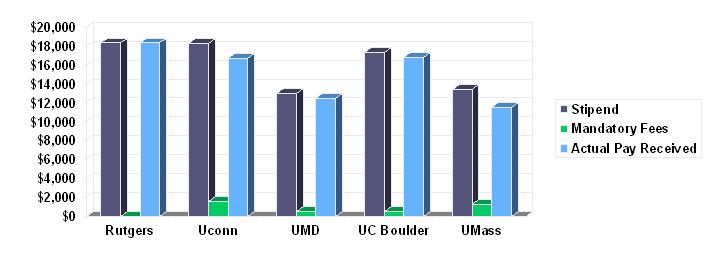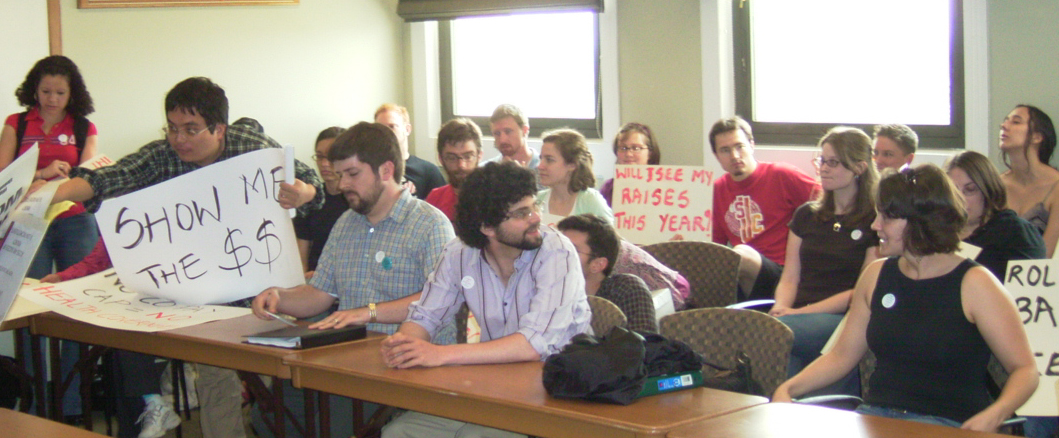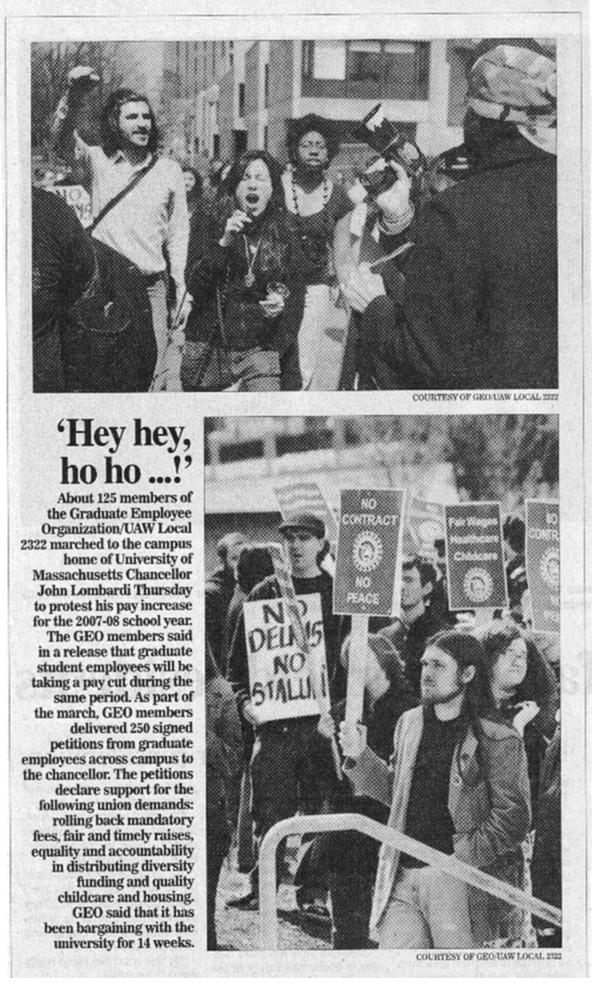Lombardi’s departure imminent, whose the new boss?
From the Daily Hampshire Gazette July 12th edition
AMHERST – With University of Massachusetts Chancellor John V. Lombardi’s departure imminent, members of the Amherst campus want to know who will lead the flagship during a year that could revolutionize the state’s public university system.
Last week, a search committee recommended Lombardi, a charismatic leader who isn’t afraid to go against the grain, as the sole candidate as the next president of Louisiana State University.
LSU’s Board of Supervisors is expected to vote on Lombardi’s appointment Thursday or Friday. If Lombardi is named president, he will likely start before September.
‘It is imperative that within the coming weeks and months that we stabilize this position,’ said Todd S. Emrick, an associate professor in UMass’ polymer science and engineering department. ‘In the UMass system, Amherst needs to have its voice of leadership as the flagship campus.’
The university system has embarked on a mission of top-level management changes.
In the past few months, UMass underwent a chancellor shake-up that affected three of the five campuses. Under this plan, Lombardi was supposed to vacate his position at the end of the coming academic year, go on a year-long sabbatical then return to UMass as a professor and adviser to the president.
In addition to the chancellor reorganization, President Jack M. Wilson has proposed a yearlong study of governance models for the UMass system. Initially, a ‘lead campus’ model, in which the president and flagship chancellor position would be combined, was floated. The university’s management and cross-campus collaborations will now be evaluated by a task force appointed by the governor.
The group is expected to deliver recommendations for UMass next March.
‘I think that he (Lombardi) would have been good in this coming year,’ said W. Brian O’Connor, the Faculty Senate’s delegate to the Board of Trustees. ‘He would have been a critic of the proposed reorganization. Now that he’s not going to be here it’s going to be difficult to fight.’
On the Amherst campus, people fear the interim chancellor could be a puppet for the UMass president’s office and Board of Trustees. Some trustees and Wilson have been accused by western Massachusetts politicians, faculty and students of hatching a reorganization plan for the university in secret. Trustee Lawrence F. Boyle made similar claims at a June trustee meeting.
Amherst campus members said the interim chancellor will need to have excellent communication skills and keep conversations between administration, faculty, staff and students open to the public. The temporary appointee will also need to fight for the autonomy of the Amherst campus and not toe the administrative line.
‘He needs to be as open as possible and not all of a sudden implement plans that certain trustees have,’ O’Connor said. ‘If the interim chancellor begins to do that then I’m confident that we’ll have another vote of no confidence.’
In May, Amherst faculty took a no-confidence vote in Wilson and the Board of Trustees in response to reorganization plans. Boston faculty took a similar vote in June.
Good seen too
Some see Lombardi’s possible early departure as a bonus for the Amherst campus. If Lombardi takes the LSU job, the fight waged by some members of the UMass Amherst Foundation, faculty, students and state politicians to keep Lombardi as the flagship chancellor can end – and more emphasis can be put on a new chancellor search.
‘If this was going to happen in a year, it’s better it happened now,’ said Max Page, co-chair of the Faculty Senate’s Executive Advisory Committee and president of the Massachusetts Society of Professors. ‘People still wanted him to stay, but clearly that wasn’t going to happen. Now we can all discuss what we want in a new chancellor.’
How soon Amherst could have an interim chancellor is not clear. According to the Boston Globe, Wilson could appoint an interim chancellor in a matter of weeks. The paper also reported this week that the Board of Trustees is forming a chancellor search committee to be headed by trustee Jennifer Braceras, according to chairman Stephen P. Tocco.
Neither Tocco or Braceras could be reached Monday for comment.
However, Robert Connolly, a spokesman for the president’s office, said Monday he was unaware of any movement by the board to create a search committee or that Wilson is considering interim candidates.
‘It’s still a little bit premature. I don’t know that there is definitely a vacancy,’ Connolly said.
Connolly added that if Lombardi takes the LSU job, Wilson, who has authority to name an interim chancellor, would seek input from campus constituents and work quickly to install a temporary leader.
Wilson is expected to visit the Amherst campus soon, possibly Thursday, to talk about the search for an interim chancellor, said Page.
The Executive Advisory Committee has invited Wilson to attend one of its meetings and the president has accepted.
‘I’m worried about the speed of the interim appointment and I’m worried about who it will be,’ Page said. Wilson ‘is coming out here at some point to talk about who he’d want for interim and how the search will run. This is the plan, but we don’t have a date.’
While no one has been officially recognized as a candidate for the interim chancellor job, a number of faculty have speculated who might fit the bill.
Names that have surfaced include: Marcellette G. Williams, who served as interim chancellor before Lombardi’s appointment and is now the senior vice president for academic and student affairs and international relations; Provost Charlena M. Seymour; and David J. Mackenzie, former interim chancellor for the Lowell and Boston campuses and executive director of the University of Massachusetts Building Authority.
Comments Off on Lombardi’s departure imminent, whose the new boss?



